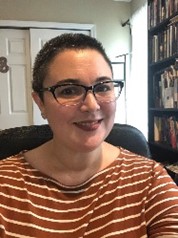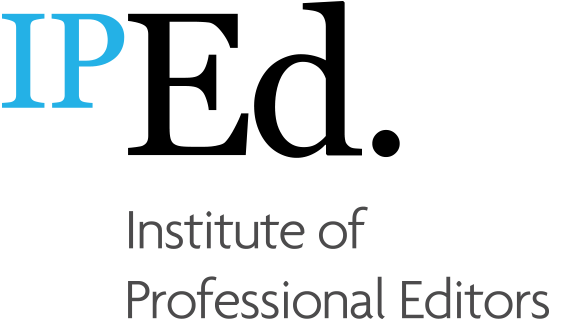From the president
Welcome to May 2022, a month of manic political campaigning. Campaigns are often good fodder for honing editorial skills like fact-checking and clear communication, but often not so good for maintaining decorum and mental wellbeing. But putting that aside, plenty of things editorial are on offer as a distraction.
But before mentioning those, I need to recognise a significant change at Editors Victoria as we farewell Donna Quinn, our branch administration officer for several years. Many members will have been in touch with Donna in that time, and many more will have benefited from her commitment to keep things running smoothly, whether that’s juggling waiting lists and resource packs for workshop participants, supporting Zoom productions, helping committee members with our many and varied queries, or even subbing in to help with other IPEd work.
Thank you, Donna, for your dedication and support to us all. We’ll look forward to seeing you at our events, just enjoying being a member.
Current priorities for the branch include support for members preparing to sit the accreditation exam and outreach to editing students. We’ll be following up our April “Ask an Editor” student Zoom session with another in May, and are facilitating some informal Zoom study groups ahead of the accreditation exam. If you’re planning on sitting the exam and would like to find some study-buddies, email me for more details at edvic.president@iped-editors.org.
And you should have received your brief member survey. If not, check your email! It won’t take long, and will help us plan for the year ahead. It’s also an easy way to let us know if you’d like to become more active in the branch. The survey is open until the end of May.
In the meantime, I look forward to seeing you at one of our forthcoming events, whether that’s hearing from a fascinating speaker, doing some indexing training, chatting about editing art materials, or joining a social gathering.
Happy editing!
By Stephanie Holt AE (edvic.president@iped-editors.org)
New members
EdVic is pleased to welcome members who have joined or upgraded since our last newsletter.
Associate members:
- Kylie Samantha Howard
- Runa Nyholm
- Charlotte Anne Wyatt
Student member:
- Lucia Roohizadegan
We look forward to seeing you at our workshops and events and encourage you to make the most of IPEd’s networks for news and support.
Professional development news
Grammar in a nutshell, with Elizabeth Manning Murphy DE and Ted Briggs AE
This workshop is now sold out. Workshop 1 will run on Friday 6 May and Friday 13 May, and Workshop 2 (repeat) will run on Friday 24 June and Friday 1 July. To be added to a waiting list, please email edvic.admin@iped-editors.org.
Indexing: adding to the editor’s skillset, with Max McMaster
This course has been open for booking since mid-April. If places remain, you can book here. If it is now full, to be put on a waiting list, please email edvic.admin@iped-editors.org.
Date: Tuesday 24 May 2022, 1.00 pm to 4.00 pm AEST and Thursday 26 May 2022, 1.00 pm to 3.30 pm AEST
Location: online via Zoom
Details: In two half-day Zoom sessions, this workshop will equip editors with the skills necessary to compile a relatively simple index, thereby expanding their skillset and, for freelancers, boosting their employability.
Using a combination of theory and guided, interactive exercises, students will cover the background, purpose and strategy for producing a good index. Topics will include:
- identifying the audience
- the attributes of a good (or bad) index
- cross-references (see and see also)
- style issues (initial articles, page spans, illustrations).
Participants will have plenty of opportunities to ask questions about any aspect of indexing.
Max McMaster, a freelance book indexer, has compiled more than 2,750 indexes in a range of disciplines, including the sciences, environment, business, cooking, travel and government reporting. He has been awarded the ANZSI Medal for book indexing on three occasions. He is also a long-standing instructor for the University of California, Berkeley Extension indexing course. Full details available at www.masterindexing.com.
An introduction to ebook editing, with Sarah JH Fletcher
Date: Saturday 4 June 2022, 1.00 pm to 3.00 pm AEST and Wednesday 8 June 2022, 7.00 pm to 8.00 pm AEST
Location: online via Zoom
Details: Ebooks are a vital part of the 2022 publishing landscape, and are especially relevant in these times of paper shortages, supply-chain disruption and the continuing rise of digital self-publishing.
What role does the editor play? In this workshop, you will learn how to adapt your existing editorial skills to ebook formats, so you can take on these projects with confidence. The course will include interactive activities and a Q&A session.
Sarah JH Fletcher has more than 15 years of professional experience, including working at Random House Australia, Murdoch Books and Koala Books, and has been a freelancer since 2011. Sarah is a long-time trainer and advocate for ebook quality, having created Australia’s first dedicated ebook course for editors in 2012 (with Natalie Costa Bir).
Book: here.
Seeking fresh blood
At the end of this committee’s term I will be stepping down as professional development officer. If you are interested in professional development and would like to contribute in any way to the program Editors Victoria runs, please contact me with any questions at edvic.profdev@iped-editors.org. These things work best when several people get involved. Plans are now being made towards the next year of courses, so step up, do your bit and have your say!
By Jane Fitzpatrick, Professional Development Officer
March speaker event report: Healthy author/editor relationships, with Sarah Grey

Photo credit: Sarah Grey
On 24 March, more than 60 members and associates attended the Editors Victoria March event to hear Sarah Grey from Pittsburgh, Pennsylvania, USA, tell us her tips on how to “get on” with authors, no matter which professional or cultural background they hail from. Her thought-provoking words of wisdom on how to avoid getting into controversial situations without damaging your reputation, work ethics, relationships and future work prospects provided some key takeaways to those attending.
The complimentary comments received from the audience on delivery and content demonstrated the value and relevance of both presenter and topic. The audience also showed their appreciation for Sarah’s willingness to do the presentation for Editors Victoria at 3.00 am, her time.
Sarah is well qualified to speak on this subject with her extensive experience and skills in providing editorial services and training editors. She has worked with a wide range of authors and clients, including scholars and researchers, revolutionaries, diplomats, rabbis, programmers, prisoners, software architects, therapists and rock stars.
Sarah’s detailed presentation, supported by slides, challenged editors to be aware that most authors consider their editors to be creative collaborators whose input is indispensable to the project, but she cautioned that others may see editors as judgmental manuscript-slashers, to be resisted and avoided.
Therefore it is important that editors demonstrate to authors from the outset that they are prepared to work with them and not against them. This helps ensure that both author and editor get off on a good footing. Building strong working relationships allows both parties to make a manuscript the best it can be.
While communication is key, other things must be factored into each of the four stages of the project life cycle, which are:
- before the project
- getting started
- works in progress
- wrapping up and next time.
Things to be factored in include:
- setting the scope and expectations at the beginning of the edit/project and how it will be overseen
- establishing trust so that the writer is confident that the editor will be a responsible custodian of their precious piece of work
- setting and maintaining personal boundaries which are professionally acceptable, such as the times, number and duration of calls, and no unreasonable advances
- querying firmly and respectfully when there is a need to, for example, when the editor and writer are not on the same page about structure, grammar or the like. This is when the editor should take on the role of guide and spell out any potential risks to the author if they keep insisting that their way is the best, if it isn’t
- approaching difficult conversations with temperance and consideration, and not taking the easy road by not explaining a course of action which could be taken
- addressing one’s own errors (we know they do occur, or not considering an author’s specialist knowledge of the subject matter, or removing the author’s voice)
- wrapping up at the end, so that the key partners (editor and author) can go their separate ways with positive vibes. (Herein lies the potential for editors to secure their next editing job.)
A positive and rewarding project outcome for both editor and author depends on a healthy relationship between both parties and will lead to future work for editors. Sarah’s tips certainly provided comprehensive detail on how to achieve this. Thank you, Sarah.
Sarah Grey is a developmental editor at O’Reilly Media and was awarded the American Copy Editors Society’s Robinson Prize for Excellence in Copy Editing. She is a writer, editor, proofreader, US localiser, indexer and all-around wordsmith at Grey Editing.
By Marie Pietersz

The Institute of Professional Editors Limited (IPEd) is the professional association for Australian and New Zealand editors.
News
We acknowledge and pay our respects to Aboriginal and Torres Strait Islander peoples as Traditional Owners, Custodians of Country and First Nations in Australia, and to Māori as tangata whenua and te Tiriti o Waitangi partners in Aotearoa New Zealand.
